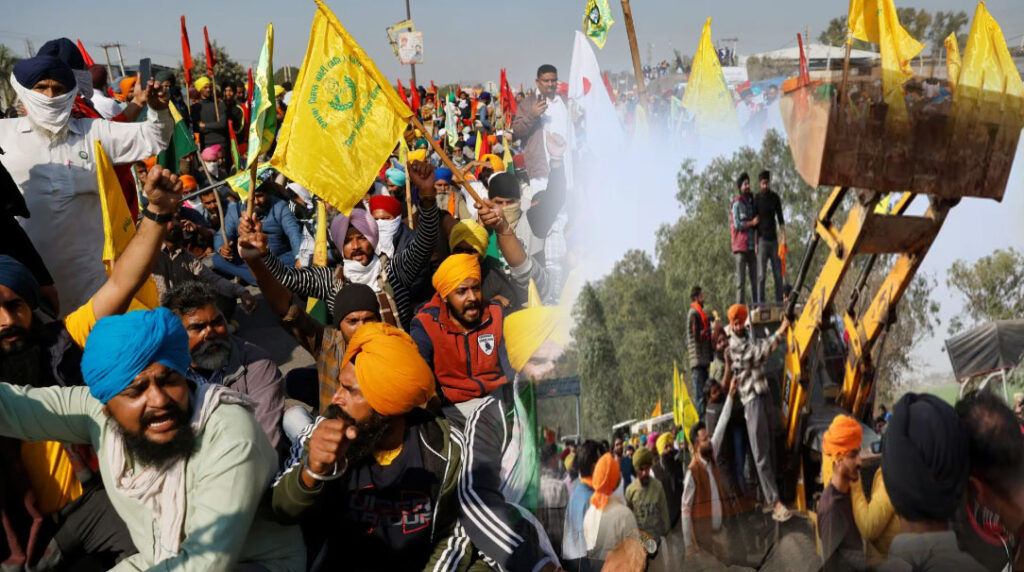Farmers’ Protest Update
Amidst escalating tensions between the protesting farmers and the central government, the ‘Kisan Andolan’ takes a decisive turn as farmers reject the government’s offer regarding Minimum Support Price (MSP) for crops. Determined to press for their demands, farmers gear up to resume the ‘Dilli Chalo’ march today, equipped with heavy machinery, including JCBs, to confront police barricades at the border.
The latest development has prompted a proactive response from law enforcement agencies. The Haryana Police DGP, in anticipation of the farmers’ march, has penned a letter to the Punjab DGP, urging for the interception and seizure of Poklane and JCB machines at strategic border points like Shambhu and Khanori. This move signifies the authorities’ apprehension about potential confrontations and the need to prevent any escalation of the situation.
Simultaneously, Delhi Police has heightened security measures across the national capital in anticipation of the farmers’ mobilization. Deployment of security personnel has been intensified at key entry points such as Tikri, Singhu, and Ghazipur borders. In a bid to enhance preparedness, security agencies conducted mock drills on Tuesday to simulate various scenarios and ensure readiness to manage any potential contingencies.
The decision to resume the ‘Dilli Chalo’ march underscores the farmers’ unwavering resolve to have their voices heard and their grievances addressed. At the heart of the protest lies the demand for the government to guarantee MSP for agricultural produce, a critical issue that has sparked nationwide solidarity among farmers.
The utilization of heavy machinery like JCBs symbolizes the farmers’ determination to overcome obstacles posed by police barricades and fortifications at the borders. This strategic move reflects the farmers’ tactical approach to assert their demands while facing increasing resistance from authorities.
The exchange between the Haryana and Punjab police departments highlights the intricate interplay of regional dynamics within the broader context of the protest. As border states, Haryana and Punjab serve as crucial battlegrounds where the confrontation between farmers and law enforcement unfolds, with each side maneuvering to gain tactical advantage.
Meanwhile, the proactive measures undertaken by Delhi Police indicate the seriousness with which the authorities are approaching the situation. The deployment of security personnel and mock drills aim to not only maintain law and order but also to mitigate the risk of potential clashes between protesters and law enforcement agencies.
The farmers’ protest, which has been ongoing for months, has evolved into a formidable movement challenging the status quo in agricultural policies. The rejection of the government’s offer regarding MSP signifies a deep-rooted dissatisfaction among farmers, who perceive the proposed measures as insufficient to address their concerns.
At its core, the ‘Kisan Andolan’ represents a struggle for economic justice and fair treatment of farmers, who form the backbone of India’s agrarian economy. The demand for MSP is not merely a matter of financial compensation but a fundamental assertion of farmers’ rights to receive remunerative prices for their produce, ensuring their livelihoods and dignity are safeguarded.
The deployment of heavy machinery by farmers underscores their commitment to peaceful resistance while confronting the obstacles erected by authorities. The use of JCBs and other equipment symbolizes the farmers’ resourcefulness and preparedness to overcome challenges in their pursuit of justice.
As the ‘Dilli Chalo’ march resumes, the spotlight once again falls on the enduring resilience of the farming community and the government’s response to their demands. The unfolding events at the border points and the capital city will serve as a litmus test for both sides, determining the trajectory of the protest and its impact on national discourse.
In the face of heightened tensions and escalating rhetoric, there is a pressing need for dialogue and meaningful engagement between the government and the farmers. The resolution of the ongoing impasse requires a genuine commitment to addressing the underlying issues and bridging the gap between the stakeholders involved.
As the nation watches with bated breath, the farmers’ protest continues to capture the imagination and solidarity of people from all walks of life. It is a testament to the enduring spirit of democracy and the power of collective action in the pursuit of social justice and equality.
